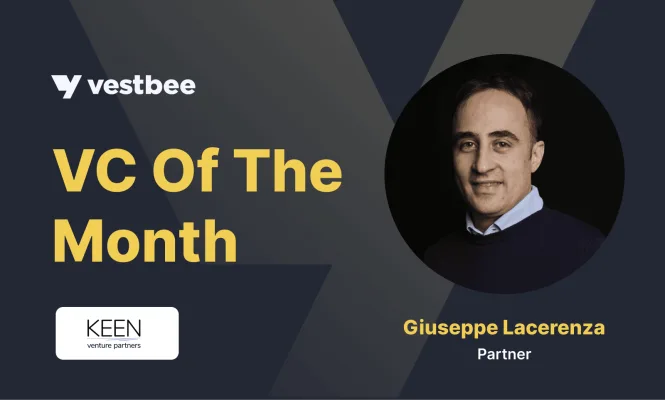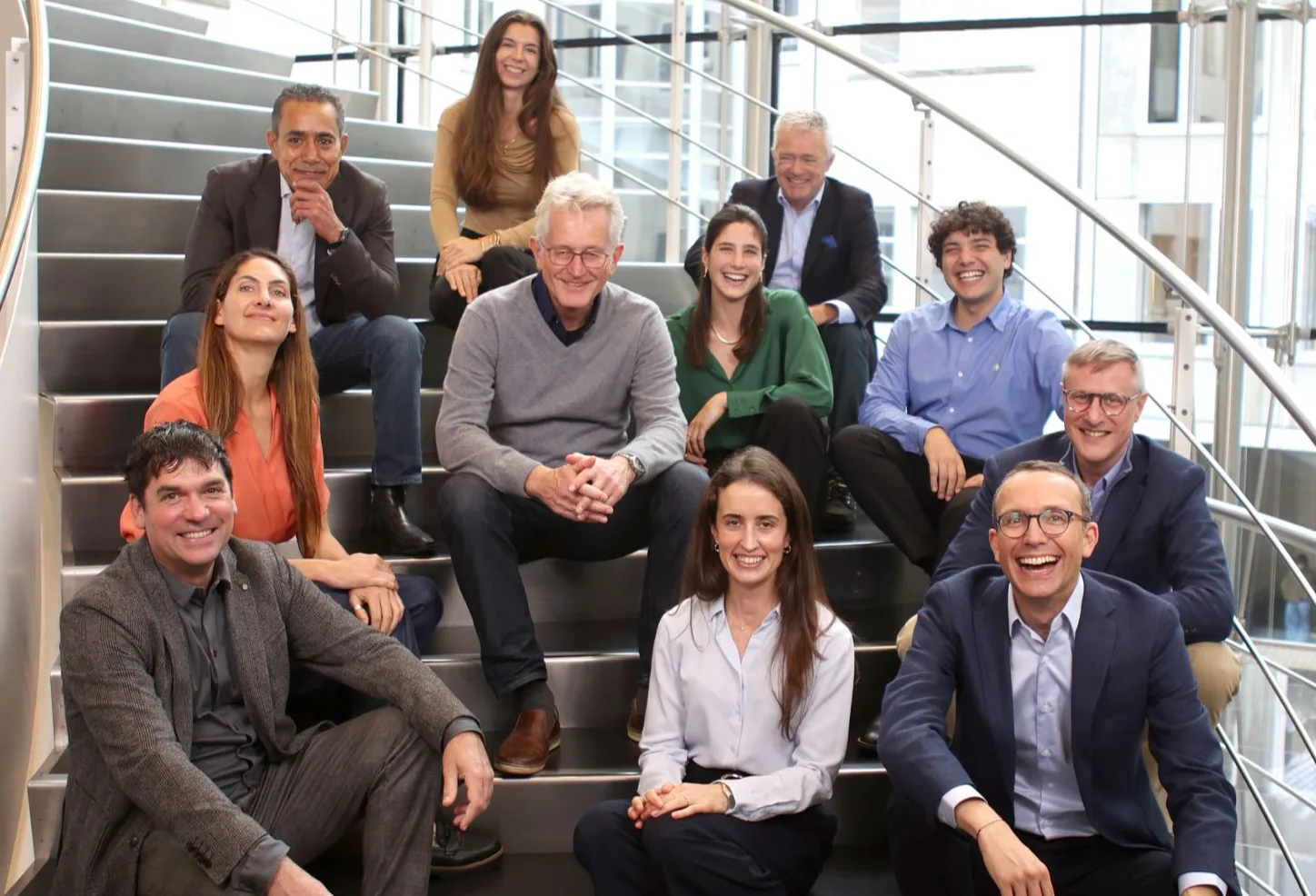Keen Venture Partners is a venture capital firm headquartered in Amsterdam, Netherlands. The firm focuses on investing in early-stage technology companies with high growth potential. Keen Venture Partners provides not only capital, but also operational and strategic support to its portfolio companies. The firm aims to partner with ambitious founders and help them scale their businesses into category leaders. It is known for its hands-on approach and deep industry knowledge, distinguishing them within the European venture capital landscape.
In May, Keen Venture Partners received commitment from the European Investment Fund (EIF) and launched its new European Defence and Security Tech Fund. The firm’s Partner, Giuseppe Lacerenza, told Vestbee more about its recent fund strategy and investment approach.
Fund strategy overview
Geography: Europe
Preferred industries: the fund's "Technology" track emphasizes areas such as enterprise software, vertical SaaS, data & analytics, productive AI, and infrastructure tech. Its new "Defence and Security" track emphasizes deeptech strands such as autonomous systems, robotics, spacetech, and frontier technologies.
Investment ticket: €1-8 million
Company stage: backs European founders from seed to Series B, with a thesis-driven, hands-on approach
Product type: primarily software, but hardware with proprietary software/data element ideal
Product stage: depending on the business model and the track
Revenues: depending on the business model and the track
Q&A with Giuseppe Lacerenza, Partner at Keen Venture Partners, on European Defence and Security Tech
What are the 5 main things you look for in a startup?
In defence and dual-use, we look for a very specific mix of traits that consistently set the strongest ventures apart.
Founder-market fit comes first: entrepreneurs who have lived the problem, whether in uniform, in government, or in industry. Their personal experience fuels the kind of relentless drive needed to succeed, because in defence the obstacles are too high for anyone chasing the opportunity casually. We’ve seen again and again that the founders who thrive are those who carry a sense of mission, solving something they once wished they had themselves on the front line or in the field.
Defensibility is equally important, with clear paths to building a moat through proprietary data, embedded workflows, or differentiated distribution. In our experience, defence buyers don’t just want a shiny, lab-tested, demo; they want systems they can trust for decades. That trust is only earned when the underlying product is not easily copied and when its integration into workflows creates real stickiness.
We also place great value on user-centricity, a deep understanding of the final user, whether that is the soldier, the pilot, or the operator, rather than only the procurement office. True adoption comes from solving for the end user. Beyond usability, this means designing systems that adapt to real-world conditions, reduce cognitive load under stress, and empower decision-making at the edge where it matters most.
Another crucial factor is European scale and interoperability. Sovereignty and competitiveness require navigating fragmented markets and building solutions that operate seamlessly across borders, not only within member states but also with trusted allies. Our priority is solutions that integrate smoothly with legacy platforms, avoiding unnecessary complexity while ensuring systems remain mission-critical and user-friendly. By adding intelligence and efficiency, we aim to simplify integration, lower costs, and strengthen Europe’s digital resilience.
Finally, we look for commercial ambition: founders prepared to move beyond bespoke projects or grants to build repeatable, scalable products that can transform markets. This often means shifting from government-funded pilots to multi-customer deployments, proving that the business can generate durable revenue independent of subsidies.
What disqualifies a startup as your potential investment target?
We’re disciplined in what we avoid, and five red flags serve as immediate disqualifiers.
- No road to productization: companies stuck in perpetual projects, pilots, or consulting loops without a clear plan to translate them into scalable products inevitably stall. Early enthusiasm from grants or pilot budgets can create a false sense of traction, but without a product strategy, momentum quickly disappears.
- No path to European traction: startups that underestimate the complexity of Europe’s regulatory frameworks, customer diversity, and interoperability requirements are unlikely to scale. Europe is not a uniform market, success requires designing with national differences in mind from the outset.
- Weak strategic alignment: if there is no intent or potential to engage with defence ministries, NATO, or government stakeholders, the startup falls outside our mandate. Dual-use potential is valuable, but in defence, ignoring the strategic layer means building in isolation.
- Fragile teams: ventures without resilient founding teams, whether too academic, too commercial, or lacking operational depth, rarely endure the long cycles and demanding environment of defence. Technology may be strong, but without balance and staying power at the leadership level, the risk is overwhelming.
- Compliance blind spots: defence is one of the most regulated industries in Europe, and startups that overlook export controls, security clearances, or data-sovereignty requirements often find themselves blocked before they can scale. Anticipating and planning for these constraints from the outset is essential.
What, in your opinion, differentiates the best founders from the rest?
Three traits set the exceptional founders apart:
- Clarity of thought: the best can see through the fog of war. They cut through noise, competing narratives, and uncertainty to articulate the problem, the solution, and a credible path to winning.
- Grit paired with ambition: in defence, long cycles and several “valleys of despair” are inevitable. Talent alone isn’t enough; without the deep drive to solve the problem itself, most would give up. The exceptional endure because the mission matters more than the obstacles.
- Adaptive communication: outstanding founders know how to adjust their message. They can speak convincingly to a general, a procurement officer, or a venture capitalist — always anchored in truth, but tailored to the context.
What startups should take into account before making a deal with a VC fund?
Capital is only one part of the equation. Defence founders should ask themselves three key questions:
- Does this investor truly understand defence and dual-use? A generalist VC may not be equipped to add value in regulated, long-cycle industries.
- What operational and strategic support do they bring? Beyond capital, the right partner helps with hiring, government engagement, international expansion, and navigating complex procurement processes.
- Do they show up in the tough moments? Great investors have reputations for standing by founders when things go sideways, not just when everything is going well. That’s why reference checks matter as much as term sheets.
What is your approach to startup valuation and preferred share in the company?
We take a founder-aligned, long-term view. Our goal is to invest at a valuation that reflects both the stage of the company and the scale of the opportunity, while preserving meaningful ownership for the founder.
Defence and dual-use companies often face heavier R&D needs and longer adoption cycles than SaaS ventures. That makes founder motivation and alignment critical. We’re careful not to overburden companies too early, but we also set valuations that enable them to raise the capital required for ambitious goals.
How do you support your portfolio companies?
We built our fund on the belief that founders in defence need more than capital. Our support rests on three deliberate pillars:
- Expert network: we have cultivated a pan-European network of policymakers, industry leaders, and armed forces contacts to accelerate adoption and open strategic doors.
- Adoption platform: we equip founders with a tailored toolkit, procurement playbooks, compliance templates, and talent networks, designed for the unique realities of defence startups.
- Operational partnership: we roll up our sleeves on hiring, go-to-market, and fundraising, and we stand with founders in their toughest moments, whether before a NATO demo, in sensitive negotiations, or during a difficult financing round.
What are the best-performing companies in your portfolio?
We measure performance both financially and strategically, and two companies in our portfolio embody this vision.
Avalor AI (now Intelic AI) is developing the next-generation AI platform for defence data fusion. By redefining how armed forces make sense of complex, multi-domain data in real time, they have already earned the trust of major European institutions and primes.
Perciv AI is building advanced computer vision systems for UAVs and defence applications. Their lightweight, high-accuracy models operate in constrained environments and deliver capabilities that competitors cannot match.
Together, these companies illustrate what success looks like in European defence tech: deep technology, dual-use potential, and meaningful traction with strategic stakeholders.
What are your notable lessons learned from investments that didn’t work out as expected?
We’ve learned the hard way that building in defence comes with unique pitfalls.
- The project loop is deadly: startups that rely on endless pilots and grants without ever productizing eventually stall.
- Procurement cycles are longer than expected: founders need more runway, and investors need more patience, to survive them.
- Not every great technology is a great business: sometimes the technical breakthrough is real, but the market is too narrow or the regulatory barriers too steep.
These lessons have made us sharper investors. Today, we are far more disciplined in how we assess productization pathways, commercial ambition, and the scalability of dual-use applications.
What are the hottest markets you currently look at as VC, and where do you see the biggest hype?
Underwater domain awareness remains underexplored, technically complex, and strategically vital. With rising maritime tensions, innovation in this field is overdue and has the potential to reshape naval operations. Software for interoperability is the glue that allows unmanned vehicles across air, land, sea, and subsea to work seamlessly together. This software layer will become increasingly critical, and ultimately more valuable, than much of the underlying hardware.
On the hype side, we remain cautious about generic cybersecurity plays, undifferentiated drone swarms, and defence startups that simply rebrand enterprise SaaS without addressing the operational realities of defence.
In your view, what are the key trends that will shape the European VC scene in the coming years?
Several shifts are set to redefine the defence and dual-use landscape:
- Defence legitimacy: what was once taboo is becoming mainstream, with institutional support from EIF, NATO, and the European Defence Fund making the sector unmistakably investable.
- Procurement reform: the move toward fixed-price procurement will reset incentives, forcing incumbents to adapt while creating space for agile new entrants.
- Dual-use by design: more startups will build for both civilian and defence markets from day one, giving their business models greater resilience.
- Pan-European collaboration: no single country can achieve industrial sovereignty alone; the future depends on capital, talent, and policy aligning across borders under the EU and NATO umbrellas.






